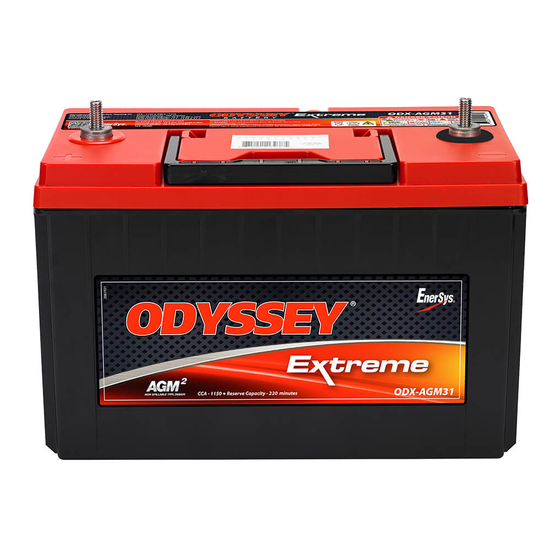
Table of Contents
Advertisement
Quick Links
Advertisement
Table of Contents

Summary of Contents for EnerSys Odyssey AGM2 Extreme
- Page 1 Technical Manual...
-
Page 2: Table Of Contents
Table of Contents Introduction ................3 Why use AGM batteries? ............3 III. Safety..................3-4 IV. Getting started ................ 4 A. Installation ..............4 B. Battery connections ............4 C. Battery cabling .............. 5 D. Torque specifications ............ 7 Technical details ..............7 A. -
Page 3: Introduction
I. INTRODUCTION ODYSSEY brand batteries are manufactured by EnerSys using its unique AGM Thin Plate Pure Lead ® ® (TPPL) technology to deliver twice the power and three-times the life of conventional AGM batteries. The recent integration of ODYSSEY Battery and NorthStar Battery brought together years of intelligence and research and development, resulting in the creation of the next generation of AGM - TPPL batteries. -
Page 4: Safety
III. SAFETY Batteries can deliver a large amount of power which can cause injury or death if not handled safely. Please follow these guidelines any time you are working around batteries. • Personal protective equipment including gloves and safety glasses should be worn. •... -
Page 5: Battery Connections
B. BATTERY CONNECTIONS Here are some general guidelines regarding different types of battery connections: • Series connections are used to increase battery voltage by connecting the positive terminal of one battery to the negative battery of another battery. In this configuration, the overall capacity of the battery is equal to the capacity of one battery. - Page 6 PLEASE REFER TO THE ILLUSTRATIONS BELOW FOR TERMINAL DETAILS. SAE and DIN Posts Female Thread These are posts in the shape of truncated This type of terminal consists of a female thread cones with slightly different diameters to which can take various adapters/terminals with indicate polarity.
-
Page 7: Torque Specifications
D. TORQUE SPECIFICATIONS Each terminal type has a different torque specification. Under-tightening of connections can lead to short circuit and electrical damage. Over-tightening can cause physical damage to the battery terminal. Refer to Table 2 below for the recommended torque specification based on the terminal type. Maximum Torque Maximum Torque Terminal Type... -
Page 8: Understanding State Of Charge
B. UNDERSTANDING STATE OF CHARGE Like all batteries, it is best that AGM batteries be kept at a high SOC. It is important to understand how to determine the SOC of AGM batteries correctly. The approximate SOC value is found by measuring the battery’s Open Circuit Voltage (OCV) with a high-quality voltmeter. -
Page 9: Battery Life Expectations
D. BATTERY LIFE EXPECATIONS Cycling Applications and Depth of Discharge (DOD) Applications in which the battery is frequently discharged and recharged are called cyclic. A complete cycle starts with a charged battery that is discharged and then brought back to a full charge. Design battery life in these applications is stated as the number of cycles the battery will deliver before its capacity drops to 80% of its rated value. - Page 10 several ways to recharge batteries and the best way depends on how the battery is being used. Charging with an Alternator When used in starting applications, ODYSSEY 12V batteries will be charged on-board using a ® standard automotive alternator that generates anywhere between 14.2-14.5V at 77ºF (25ºC). We recommend a temperature compensation of the charge voltage at ±18 mv per battery per ºC variation in temperature from 25ºC.
- Page 11 below as an example of recharging a battery rated at 100 amp-hours from various depths of discharge using a 10-amp constant current charger. Open Circuit Depth of Discharge Charge Time Voltage (hours) 12.6 12.2 11.9 11.5 Table 6 Temperature Compensation of Charge Voltages Proper charging of all AGM batteries requires temperature compensation of the charge voltage.
-
Page 12: Parasitic Loads
G. PARASITIC LOADS In many cases batteries that are apparently at rest may be supplying a small amount of current to connected equipment such as radios, clocks and security systems, to name just a few examples. Modern vehicles have multiple on-board computers that require small amounts of power to keep them alive. -
Page 13: Maintenance
below 9.6 v indicates a failed battery. For temperatures below 70°F (21°C), refer to Table 7 on the next page for voltage. Most of these testers will specify whether the battery passed or failed the test. This can be an ideal test for batteries used in starter applications. Temperature End of Test Voltage 70°F... -
Page 14: Warranty Considerations
K. WARRANTY CONSIDERATIONS ODYSSEY AGM batteries are covered by warranty against defects in material and workmanship for at least two years. Some models and applications are covered for longer. Please note that the following actions will void any warranty coverage: •... -
Page 15: Definitions Of Acronyms
realistic. Because the discharge is for such a short time, it is more like a pulse. The low impedance of ODYSSEY battery technology allows them to maintain a higher voltage for more starter pulses, resulting in less heating of starter motors and cables. Higher power output results in a faster start. What is impedance? The impedance of a battery is a measure of its internal resistance. - Page 16 Singapore 189721 Literature Library +1-800-538-3627 Tel: +65 6416 4800 © 2021 EnerSys. All rights reserved. Trademarks and logos are the property of EnerSys and its affiliates unless otherwise noted. Subject to revisions without prior notice. E.&O.E. www.enersys.com AMER-EN-TM-ODY July 2021...














Need help?
Do you have a question about the Odyssey AGM2 Extreme and is the answer not in the manual?
Questions and answers